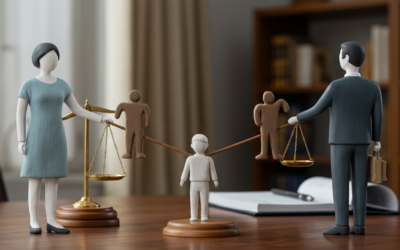Whether you’re baffled to find divorce papers on your kitchen counter, or it’s been a long time coming, the process of divorce can be overwhelming and confusing. The life you knew will be changing, and it can feel like your rights as a wife may be taken away.
Fear not—as experienced Wisconsin divorce lawyers, we at Vanden Heuvel & Dineen, S.C. have the experience and expertise to guide you through this difficult time and protect your interests.
With careful consideration and legal guidance, you can navigate the divorce process and come out on top. Here are some things to keep in mind:
Grounds for divorce in Wisconsin
Denial is often the first reaction to divorce papers, especially if the decision seems sudden. You might be wondering, “Why is my husband doing this? Is it my fault?”
Wisconsin, like many states, has a no-fault divorce policy. That means the reason for the divorce does not have to be proven in court. In Wisconsin, the only grounds for divorce is that the marriage is “irretrievably broken. Don’t look for loopholes or try to prove fault—it’s a waste of time and money. Instead, focus on getting the best outcome for yourself.
Does it matter who serves the papers first?
You might also be scared that your husband will try to “beat you to the punch” and serve you divorce papers first. In Wisconsin, it doesn’t really matter who serves the papers first. He won’t gain a strategic advantage or be able to manipulate the situation in any way.
However, responding quickly and appropriately once you’ve been served is essential. The court may make decisions without your input if you don’t file a response within 20 days. This could significantly impact the outcome of your divorce proceedings, so make sure to consult with a lawyer as soon as possible.
Who takes care of divorce in Wisconsin?
Before doing anything else, it’s important to familiarize yourself with the court system in Wisconsin. The circuit courts handle divorce cases, child custody, support, and property division. While not all divorces get as ugly as war, they remain a battle. Knowing the layout of the battlefield is the first step in preparing for the fight.
It’s important to note that each county has its own circuit court, so make sure you file in the proper jurisdiction (typically where either you or your spouse reside). Filing in the wrong county could delay the proceedings.
Steps to take during a divorce
Seeking legal help
First and foremost, consult with a lawyer. Divorce can be complicated, and it’s crucial to make sure your rights are protected. A lawyer can also provide valuable guidance throughout the process and advise you on the best course of action—whether that means negotiating an agreement or going to court.
At Vanden Heuvel & Dineen, S.C., we have over 40 years of experience in family law, including divorce cases. Our experienced attorneys will tirelessly protect your interests and ensure the best outcome for you.
Gathering evidence and documents
Your lawyer will advise on what documents and evidence to gather. Generally speaking, it’s best to have financial records (pay stubs, bank statements, tax returns), property titles and deeds, and any other documents relevant to the divorce proceedings.
You should also maintain a record of any relevant communication with your spouse—for example, emails or text messages regarding child custody arrangements or division of property. These can help your case if it goes to court and will give your lawyer a better understanding of the situation.
Protecting your assets
Your lawyer can help protect your assets and ensure they are fairly divided during the divorce settlement. In some cases, a spouse may try to hide or transfer assets in an attempt to avoid dividing them in the divorce. It’s important to keep track of your finances and notify your lawyer if anything seems suspicious.
It may also be wise to open separate bank accounts and credit cards in your own name. If that’s not possible, consider freezing joint accounts to prevent your spouse from withdrawing or transferring funds without your knowledge. Doing so can help protect your finances and give you some financial independence during the process.
All about mediation
Most people dread going to court, and for a good reason. Court proceedings can be drawn out and expensive, not to mention emotionally taxing. In Wisconsin, the court may require you and your spouse to attend mediation before going to trial.
Mediation offers an alternative way of resolving conflicts and reaching a settlement agreement. It involves meeting with a neutral mediator who facilitates communication and helps both parties reach a mutually agreeable solution. It can save time, money, and emotional stress for both parties involved.
During a session, the mediator will guide both parties in discussing and negotiating the divorce terms, such as child custody and support, division of assets and debts, and alimony. The mediator may also make suggestions or give guidance on potential solutions. It’s important to remember that participation in mediation is voluntary—either party can choose to opt-out at any time.
As such, it works best when both parties are willing to communicate and compromise. And while it may not be a perfect solution, mediation can often result in a faster and less contentious resolution than going to court.
Going to trial
When all else fails, the divorce may go to trial. The trial involves both parties presenting their case before a judge, who will ultimately decide on the terms of the divorce. It’s important to have a strong legal team by your side throughout this process, or you may get swindled or not get what you rightfully deserve.
Both parties will present evidence and testimony to support their case during a trial. Your lawyer will advise on the relevant evidence and how to present it in court effectively. They will also cross-examine the opposing party’s witnesses and argue your side of the case before the judge.
Finalizing a divorce in Wisconsin
At last, after potentially months or even years of legal proceedings, the judge will issue a final divorce decree. This decree legally binds both parties to the terms agreed upon in the settlement, such as the division of property and child custody arrangements.
In Wisconsin, there is a 120-day waiting period before the divorce can be finalized. During this time, either party can still make changes to the settlement agreement. After the waiting period, the divorce can be finalized, and both parties can move forward with their lives.
Contact Vanden Heuvel & Dineen, S.C. for legal representation.
Don’t try to navigate the treacherous waters of divorce on your own. At Vanden Heuvel & Dineen, S.C., our attorneys can help protect your rights and guide you through every step of the legal process. We’ll make this rough voyage as smooth as possible for you. Contact us today to schedule a free consultation.




